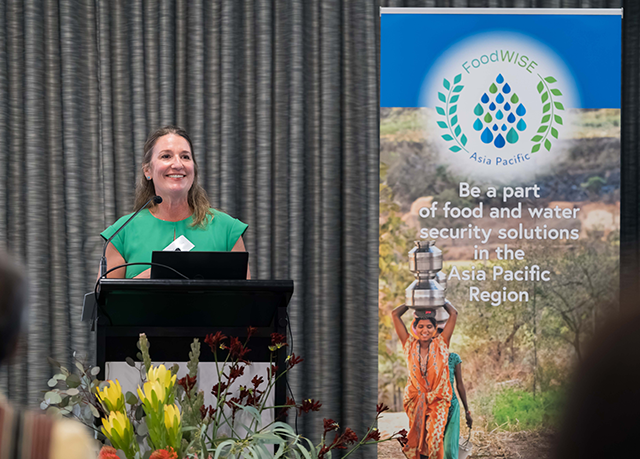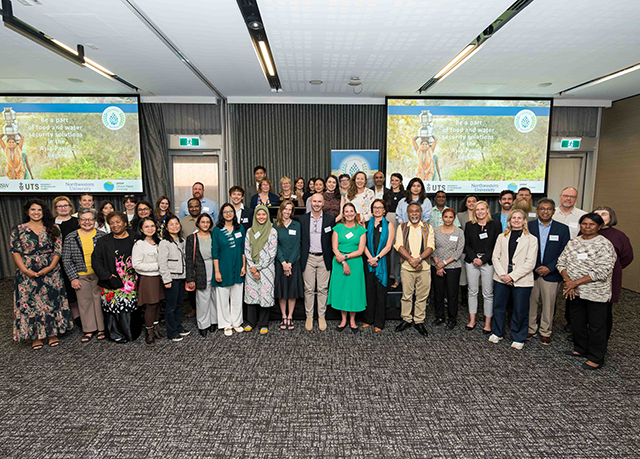Forging Regional Networks to Measure Water’s Hidden Connections
IPR anthropologist Sera Young teams up to create regional networks to track water insecurity
Get all our news
Water matters for water's sake, but it has connections to almost all of the stuff we care about. The Water Insecurity Experiences Scales make those hidden connections easy to see—and to measure.”
Sera Young
IPR anthropologist

Sera Young discusses the WISE scales at the launch of a new regional network in Sydney.
Food and water insecurity are growing global challenges, and no country—no matter how wealthy—is immune. More than 13% of Australians, for example, faced food insecurity in 2023, with that rate jumping to 34% for households with dependent children. And lower-income Aussie households experienced moderate-to-high water insecurity at four times the rate of the rest of the nation (4% to 1%).
To address these complex, global issues, IPR anthropologist Sera Young has been part of efforts to establish regional networks that can coordinate action and provide scalable measures food and water insecurity. Most recently, she co-organized and attended the launch of the FoodWISE Asia Pacific Network in Sydney from Sept. 17–18. This launch followed her work co-organizing a similar network for Latin America and the Caribbean, the WISE-LAC Research Network, in April 2023.
“Nothing makes good science come to life more quickly than face-to-face interactions with colleagues,” Young said.
The Asia Pacific network launch brought together 50 international experts and community leaders from 15 countries, including Australia, India, Timor-Leste, the U.K., and Vietnam. Northwestern University jointly hosted the event with two Australian universities, the University of Technology Sydney and the University of New South Wales.
“This is a very challenging topic, but a very important one. Without this work, in 20 years, all hell will have broken loose beyond anything we experienced during the pandemic,” said Deputy Vice Chancellor Kate McGrath of the University of Technology Sydney in welcoming the participants.
At the workshop, Young discussed the creation of the Water Insecurity Experiences, or WISE, Scales the development of which she led, with an international team of scholars and practitioners. The scales provide the network’s member countries with on-the-ground “lived experiences” data on water access and use.
“Water matters for water's sake, but it has connections to almost all of the stuff we care about," Young told attendees. “The Water Insecurity Experiences Scales make those hidden connections easy to see—and

Attendees celebrate the launch of the FoodWISE Asia Pacific Network in
Sydney with a photo.
to measure.”
Now used in more than 90 countries around the world, the WISE scales chart people’s experiences with water access, use, and reliability in 12 or fewer questions that can be answered in minutes. They also permit researchers to compare data across countries, and a variety of sociocultural, infrastructural, and ecological contexts.
The FoodWISE Asia Pacific Network will provide avenues for ongoing engagement, shared learning, and coordinated action on food and water security in the region. In addition to bringing together global food and water experts, the network seeks to foster collaboration across local, national, and global institutions. This includes governments, international development agencies, and NGOs, like the World Bank, UNICEF, and Save the Children.
Importantly, the network seeks to foster community-led approaches. Workshop attendees heard from a number of indigenous community leaders, like Aunty Norma Kennedy, an aboriginal elder from Walgett, Australia, whose people are among those most affected by food and water insecurity.
“The river flowed clean—beautiful water—we could swim in it, fish, catch freshwater yabbies [crayfish]. We could live off it,” Kennedy recounted. “The river today is disgusting, very disgusting. We can’t drink the water. Can’t fish from it.”
“By not drinking from it, every day we need to buy water from the IGA [a local grocery store] and that takes away from buying food in a time of increased cost of living,” she continued. “Our mob is dying out. Fast. And it’s from this water.”
Young previously advised on efforts in Walgett in 2022 using the WISE Scales, to gauge local experiences with water. The survey showed that unsafe tap water led to water insecurity.
Elsewhere in the Asia-Pacific region, the WISE Scales were used in the wake of the volcanic eruptions in the Kingdom of Tonga. There, they revealed that water insecurity was tightly linked with food security and mental health.
“Water insecurity touches on almost all health outcomes, and plenty of other issues beyond health, like economic prosperity and political stability,” she said. “It’s time that we gave water security the attention it is due.”
Sera Young is a professor of anthropology and global health, an IPR Morton O. Schapiro Faculty Fellow, co-director of the Northwestern Center for Water, and co-editor-in-chief of PLOS Water.
Photo credits: Baxter Visuals
Published: October 24, 2025.


